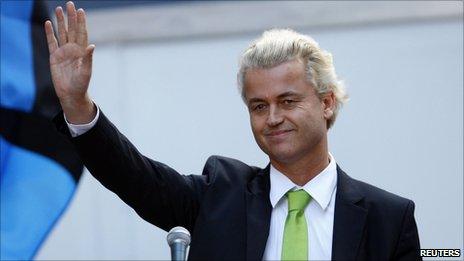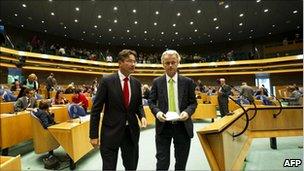Netherlands Islam Freedom: Profile of Geert Wilders
- Published

Geert Wilders was at Ground Zero to condemn plans for a nearby Islamic centre
Geert Wilders, the prominent Dutch politician cleared of inciting hatred against Muslims over his campaign against Islam in public life, is a deeply divisive figure.
On the one hand, he has certainly antagonised the Muslim world by calling for a ban on the Koran, which he likened to Adolf Hitler's Mein Kampf.
On the other, he was voted politician of the year in 2007 by the Dutch political press, partly because of his "well-timed one-liners".
His Freedom Party went from winning nine seats in the 2006 election to 24 in 2010, taking a bigger share of the vote than the Christian Democrats - the main party in the outgoing government. He did not formally join the new government coalition - but it relies on his party for support.
If his views on Islam are inflammatory, his other opinions sit in the Dutch libertarian tradition, and he argues that he is only "intolerant of the intolerant".
Instantly recognisable for his mane of platinum blond hair, which earned him the nickname "Mozart", he is a charismatic leader.
Inflammatory themes
Mr Wilders made a high-profile foray into the world of global politics on 11 September 2010, when he marked the ninth anniversary of the 9/11 attacks with a visit to Ground Zero in New York.
In a <link> <caption>speech to a rally against the construction of an Islamic centre</caption> <url href="http://www.geertwilders.nl/index.php?option=com_content&task=view&id=1712" platform="highweb"/> </link> near the site, he contrasted the "forces of Jihad" with New York's tradition of tolerance, which he tied to his own country's.
His speech echoed themes from Fitna (which roughly translates from Arabic as "strife"), his hugely controversial film which juxtaposes the Koran with 9/11 and other atrocities.
No TV company in the Netherlands would broadcast the 17-minute film and some Dutch politicians tried to impose a ban before Mr Wilders posted it on the internet in March 2008.
Dutch Foreign Minister Maxime Verhagen complained the furore over Fitna could endanger Dutch companies, soldiers and residents abroad.
Asked about the impact of his film, Mr Wilders said: "It's not the aim of the movie but people might be offended, I know that. So, what the hell? It's their problem, not my problem."
Attempts by the Freedom Party leader to carry his anti-Islam message abroad have brought him into conflict with other Western states.
The British Government tried to ban him from the UK on the grounds that he posed a threat to public security, though the move was later overruled by the courts.
Liberal background

Political foes like Maxime Verhagen (left) are having to accommodate Mr Wilders
Former colleagues describe Mr Wilders as a 24/7 politician with no time for other interests.
Born in the Limburg town of Venlo in 1963, he came from a Roman Catholic background but has since said he is not religious.
The son of a printing company director, he began a career in social and health insurance, and socio-economic policy brought him into politics, as a speech-writer for the Dutch Liberal Party (VVD).
He was elected as a city councillor in Utrecht in 1997 and MP the following year, but he disagreed with the party's support for Turkish entry into the EU and left it in 2002 to strike out on his own.
It is a measure of his meteoric rise through Dutch politics that since the 2010 election, the VVD has found itself relying on Mr Wilders to support its coalition with the Christian Democrats, though the Freedom Party remains outside the government.
Mr Wilders has prompted comparisons with Pim Fortuyn, the maverick political leader who famously described Islam as a backward religion.
Fortuyn was murdered by an animal rights activist in 2002, shortly before an election.
It was another high-profile murder, in November 2004, which altered Mr Wilders's career dramatically: the slaying of Dutch film-maker Theo van Gogh by a radical Islamist.
Together with ethnic Somali politician Ayaan Hirsi Ali, Van Gogh had produced the short film Submission, which featured an actress in see-through clothing with Koranic script on her body.
Although he had no involvement in the film, Mr Wilders was given a permanent bodyguard, as was Ms Hirsi Ali, because of their outspoken views on Islam.
The Freedom Party's policies include banning the burka, the Muslim garment that covers most of the body, and banning Muslim Halal slaughter (as well as Jewish Kosher slaughter). He says such practices are incompatible with Dutch values.
'Acceptable' statements
Mr Wilders, whose wife is Hungarian, is adamant that he is not a racist.
He told the BBC his intention had only ever been "to have a debate about freedom of speech and the threat of Islamisation of our Western societies".
"It's not my intention to have anything at all to do with violence," he said.
"On the contrary, I despise violence - I just want a debate."
Unlike other figures on the fringes of European politics, he has never been accused of anti-Semitism. On the contrary, he is a strong admirer of Israel, visiting the country frequently.
"My allies are not Le Pen or Haider..." he <link> <caption>told the Guardian newspaper</caption> <url href="http://www.guardian.co.uk/world/2008/feb/17/netherlands.islam" platform="highweb"/> </link> , referring to other European far-right leaders.
"We'll never join up with the Fascists and Mussolinis of Italy. I'm very afraid of being linked with the wrong, rightist, Fascist groups."
One of his criticisms of Muslims in the Netherlands is their conservative stance on sexual freedoms, such as gay rights.
"I believe we have been too tolerant of the intolerant," he told the BBC.
"We should learn to become intolerant of the intolerant."
Amsterdam judges moved in January 2009 to try Mr Wilders for inciting hatred and discrimination, arguing that "by attacking the symbols of the Muslim religion, he also insulted Muslim believers".
However, acquitting Mr Wilders of all charges on 23 June 2011, Judge Marcel van Oosten said: "The bench finds that your statements are acceptable within the context of the public debate."
- Published30 September 2010
- Published10 June 2010